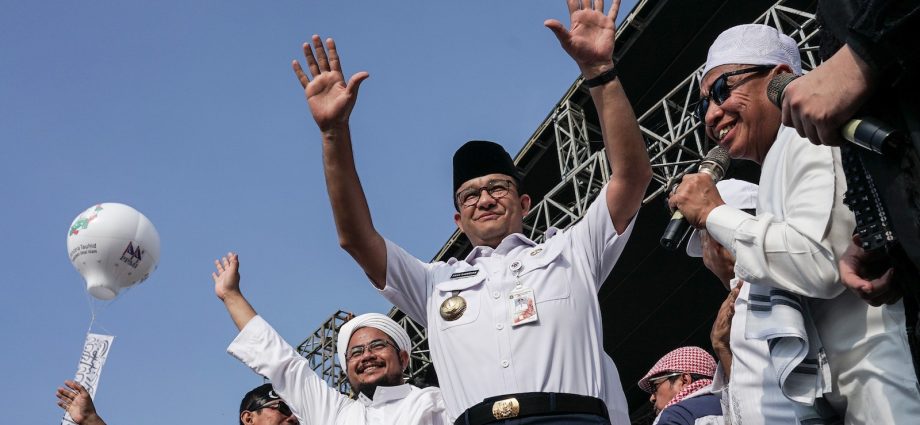JAKARTA – Valid or not, it is proving difficult for President Joko Widodo to fend off claims that a political motive lies behind last week’s arrest of National Democrat Party-affiliated (Nasdem) Communications and Informatics Minister Johnny Plate on corruption charges.
Although a cloud had been hanging over him for months, it must still have taken the president’s nod to indict Plate for allegedly causing losses to the state of 8 trillion rupiah (US$536 million) in the installation of telecom base transceiver stations (BTS) in remote corners of the vast archipelago.
Nasdem has three ministers in the current Cabinet, but party leader Surya Paloh created tensions within the government – and sparked rumors of a pending reshuffle – after declaring his support for opposition presidential candidate Anies Baswedan last October.
Although there had been some friction between the two, Paloh’s move to switch sides clearly took Widodo by surprise because the bearded media baron had been the first senior political figure to support him when he ran for the presidency in 2014 and again in 2019.
With the Justice and Prosperity (PKS) and Democrat (DP) parties already lining up behind Baswedan, Nasdem’s support allowed the former Jakarta governor to clear the threshold of 20% of parliamentary seats necessary to be nominated for what is shaping up to be a three-way race.
Jakarta’s political elite are wary of Baswedan because of his links to Islamic conservatives and because of the belief he could attract substantial votes from among the 56% of the electorate that is under 40 and has differing political views.
Although his chances do appear remote at this point, his election would also represent a changing of the guard among the powerful politically-connected businessmen who surround the current government.

Paloh acknowledged in a recent interview that there have been persistent efforts by intermediaries to get him to change his mind. If he did, and he shows no signs of relenting, it would leave the race without a genuine opposition candidate.
There have also been several investigations by the Anti-Corruption Commission (KPK) and the police seeking to implicate Baswedan himself in a graft case linked to Formula E race staged in Jakarta in mid-2022, but they have apparently been unable to find proof.
Widodo has yet to make it clear who he will endorse for the presidency: ruling Indonesian Democratic Party for Struggle (PDI-P) candidate Ganjar Pranowo or Defense Minister and Great Indonesian Movement (Gerindra) leader Prabowo Subianto.
Paloh has insisted he will continue to support government policies through the rest of Widodo’s tenure, and until now Widodo has resisted pressure to remove Plate and the two other Nasdem Cabinet members, Agriculture Minister Syahrul Yasin Limpo and Environment and Forestry Minister Siti Nurbaya Bakar.
But Attorney General Sanitiar Burhanuddin’s action in arresting Plate, 66, Nasdem’s concurrent secretary-general, could present him with the excuse to finally proceed with the long-rumored shakeup. The minister was removed from his post on May 17, the day he was detained.
A career prosecutor, Burhanuddin claims to be a political independent, but his older brother is senior PDI-P politician Tubagus Hasanuddin, a retired two-star general and former military secretary to party leader and then-president Megawati Sukarnoputri.
Earlier this month, the president failed to invite Paloh to a meeting of chairmen of six political parties making up the ruling coalition, hinting that a reshuffle could be imminent. “This is about the coalition’s business,” he told reporters. “Do they (Nasdem) have to know what strategy we are planning.”
Four of Widodo’s ministers have already been jailed for corruption during his nine-year term, including sports minister Imam Nahrawi (National Awakening Party), fisheries minister Edhy Prabowo (Gerindra) and social affairs ministers Idrus Marham (Golkar) and Juliari Batubara (PDI-P).
The latest scandal may be the worst case of high-level corruption since 2017 when Golkar Party chairman and House of Representatives speaker Setya Novanto was jailed for 15 years for embezzling $172 million from an electronic identity card program.

Plate and five other suspects are accused of padding the cost of studies for the national rollout of new 4G towers, marking up the price of equipment and pocketing money destined for stations that were either not built or aren’t functioning.
Plate’s younger brother, Gregorius Alex Plate, is also under scrutiny as the alleged intermediary between sub-contractors and the ministry in the construction of 7,904 towers in Sumatra, Kalimantan, Maluku, Sulawesi and East Nusa Tenggara between 2020 and 2022.
Indonesia has reached an impressive 95% of mobile phone availability, with coverage provided by state-owned Telkomsel, the biggest and only provider operating in all 38 provinces, the newly merged Indosat Ooredoo-Hutchinson, XL Axiata and Smartfren.
Unlike towers in populous regions, the funding for remote stations comes from the Universal Service Obligation (USO), a long-recognized consumer protection mechanism in which in Indonesia’s case a 1.75% tax is levied on the gross profits of all telecom companies.
Without it, individual carriers would not find it commercially viable to expand their networks into areas where they would never recoup the $100,000-$150,000 cost of building a single BTS.
Telkom Indonesia, Telkomsel’s majority owner, operates about 138,000 stations across Indonesia, a huge increase over the 1,575 in 2014. The mobile phone subsidiary booked revenues of $5.8 billion in 2021, while the parent reported a net profit of $1.8 billion.
The Communications and Informatics Ministry budgeted 9.5 trillion rupiah from the USO for the BTS program in 2020, with 4,200 towers planned for 2021 and 3,700 more in 2022. According to the ministry’s website, about 1,900 locations are currently in operation.
“The USO is a great big pot of money,” says one telecom executive. “What makes it egregious is that it is meant for disadvantaged people. We are never allowed to ask, and we are never told, where the money goes. As far as we know, there isn’t even an audit.”
That all changed when the Attorney-General’s Office began its investigation and brought in the BPKP, the state’s audit agency, to check the numbers.

